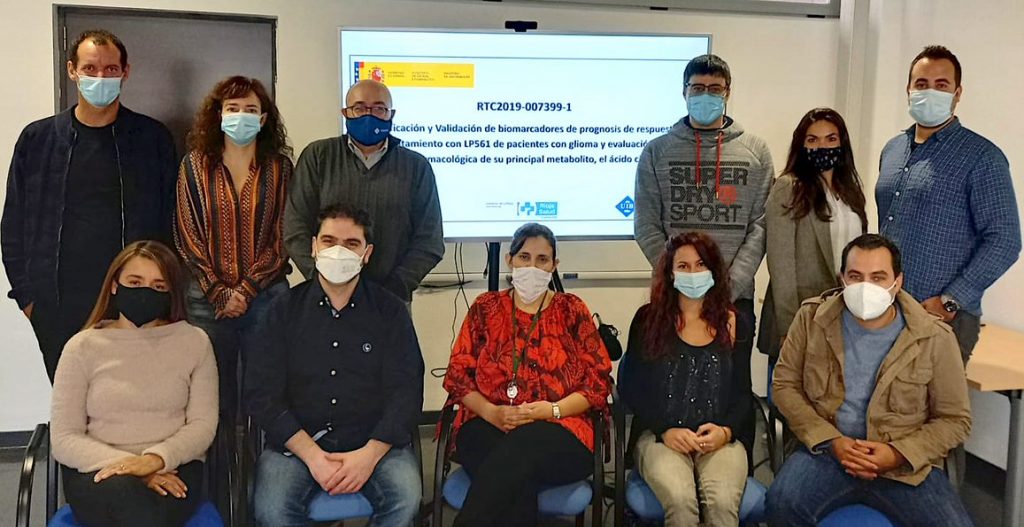20 Nov Spanish biotech company Laminar, the Fundación Rioja Salud and the University of the Balearic Islands will receive one million euros from the Ministry of Science and Innovation to study brain tumor biomarkers

From the left, top: Adrian McNicholl, Gema Malet, Pablo V. Escribá, Ignacio Larrayoz, Paula Fernández y Roberto Beteta.
Seated: Emilce Cano, Rafael Peláez, Catalina Rosselló, Raquel Rodríguez y Manuel Torres.
November 20th, 2020
The Spanish government has announced the public grants corresponding to the State Program for research, development and innovation call — geared towards societal challenges and called “Collaboration Challenges of the year 2019”. These are instruments to help meet the needs of the Spanish Science, Technology and Innovation System and its main agents.
One of the approved proposals has been the project GLIOPROG561 (RTC2019-007399-1) led by the company Laminar Pharmaceuticals in collaboration with the CIBIR- Biomedical Research Center of La Rioja (Fundación Rioja Salud) and the University of the Balearic Islands (UIB), whose objective is the “Identification and validation of prognosis response biomarkers in treatment with the LAM561 molecule in patients with glioma and evaluation of the pharmacological activity of its main metabolite”.
This is an interdisciplinary project in which lipid chemistry, proteomics, bioinformatics, genomics and molecular biology are combined to maximize the chances of finding effective biomarkers. The participation of the CIBIR in this consortium guarantees — thanks to their extensive experience — high quality bioinformatics analyses and great reliability in the validation of the identified biomarkers.
This project answers one of the call’s objectives, which is the consolidation of R&D and innovation capabilities as well as the generation of knowledge and research teams that carry out their activities in universities, public research organizations and other research organizations. In total, the grant amounts to 1,058,759 euros from the budget of the Ministry of Science and that of the State Research Agency for 2020.
The financed projects all have a duration of several years: they will have begun their execution throughout the present year 2020 and will end on the date indicated in the grant request, between mid and late 2023. The public Challenges-Collaboration grants correspond to the State Program for Generation of Knowledge and Scientific and Technological Strengthening of the R&D and Innovation System, within the framework of the State Program for R&D and Innovation Geared towards the Challenges of Society, belonging to the State Plan for Scientific and Technical Research and Innovation 2017-2020.
The aforementioned State Plan is the main instrument of the General State Administration for the development and achievement of the objectives of the Spanish Strategy for Science and Technology and Innovation 2013-2020 and the European 2020 Strategy. It includes state grants for R&D and innovation, which are preferably awarded through competitive calls. These projects are evaluated by experts from the fields of basic science, clinical science, economics and finance.
Manuel Torres Canalejo, researcher at the University of the Balearic Islands: “The development of biomarkers for the diagnosis, stratification and monitoring of the efficacy of an antitumor drug is an innovative aspect of this project, since there are very few biomarkers currently available for this disease. Their identification is a key factor for the development of precision therapies for different pathologies, with greater efficacy and fewer side-effects and healthcare costs. The use of biomarkers in the field of brain tumors is immensely relevant since their classification based on molecular characterization was published in 2016 (Louis et al, 2016). This project addresses, for the first time, the use of lipid molecules as potential biomarkers for treatment and diagnosis in brain cancer, a significant step in the study of such a complex neuro-oncological pathology.”
Ignacio Larráyoz, principal investigator of the CIBIR Biomarkers and Molecular Signaling Unit, applying the latest sequencing and molecular biology techniques to discover new biomarkers in high-impact diseases: “In this project, a large number of molecules will be evaluated using -omic techniques, or related methods, with the goal of finding a biomarker that enables precise diagnosis and, at the same time, reduces the exposure and costs associated with magnetic resonance testing.”
Pablo Escribá, CEO of Laminar Pharma: “Innovation in cancer therapy in general and glioma in particular is a fundamental requirement to be able to provide innovative therapeutic tools that reduce mortality caused by tumor pathologies. In this sense, the exciting and promising pharmacological profile of our LAM561 molecule are the result of highly innovative aspects in its rational design.”
About Laminar Pharma
Laminar Pharma is a research and development company for drugs designed using molecular and cellular biology. The company is committed to translational research in the healthcare industry, using melitherapy (Membrane Lipid Therapy) as a pioneering and highly innovative therapeutic platform to study its molecules for various purposes in Oncology and other areas with important therapeutic needs. In addition to the large therapeutic areas, Laminar has demonstrated commitment to underserved segments, such as rare disease and pediatric patients. Founded in 2006 as a spin-off of the UIB (University of the Balearic Islands), it currently has offices in Palma de Mallorca and Acton (USA).

